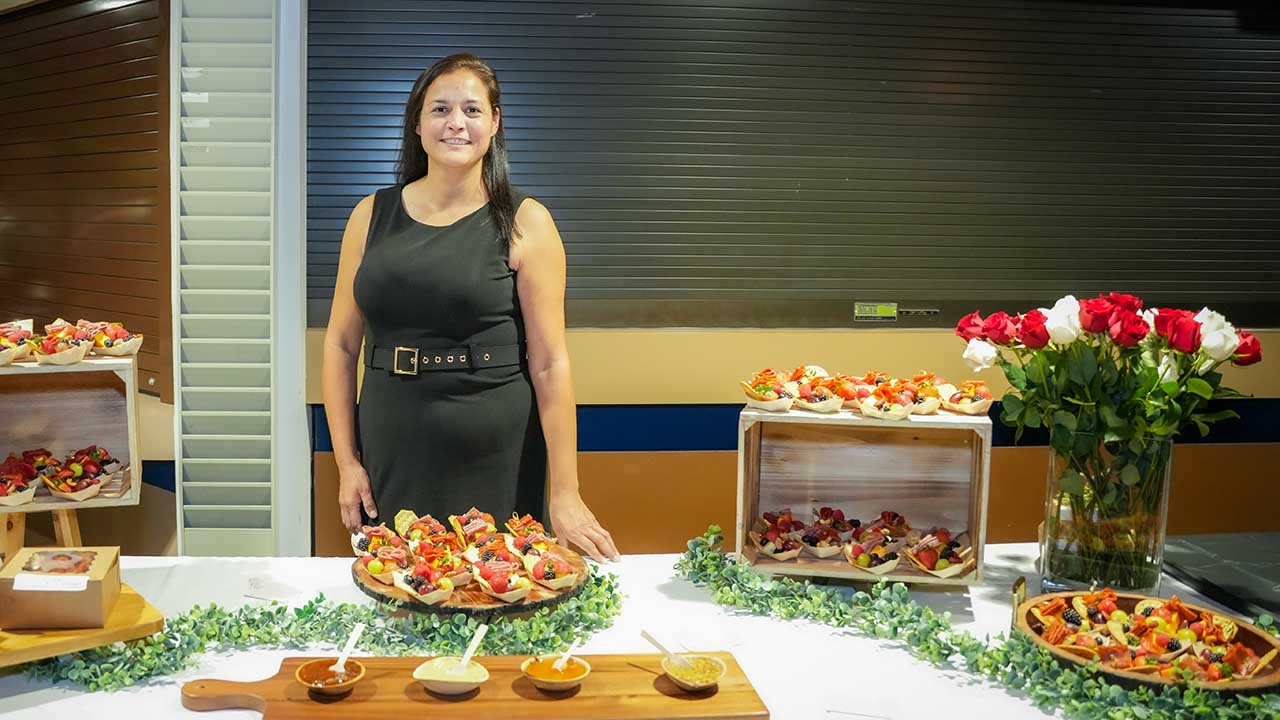
Rosa Benavides is the owner of La Paloma Blanca Charcuterie & Co. and also a graduate of an Asociación de Emprendedor@s program. (Photo courtesy of Asociación de Emprendedor@s)
May is California Small Business Month! Today we’re highlighting an inspiring program that supports small business owners. All yearlong, our Entrepreneurship and Small Business Ownership by Women and People of Color Work Group is prioritizing the building of a supportive ecosystem for the state’s entrepreneurs and small business owners. Read more in our 2023 Roadmap to Shared Prosperity.
After two decades of working in the corporate world in sales and leadership development, Monica Robles decided to start her own consulting business.
“I opened a business and I didn’t have a lot of information, so I closed my business in less than a year,” recalled Robles. “No wonder people don’t continue; the information is scattered all over the place about how to start a business.” Then she realized the hurdles must be even higher for monolingual Spanish-speaking entrepreneurs.
In 2016, she created the curriculum to support women who suffered domestic violence and needed a way to became financially independent from their abuser. While developing the program, she learned there was a great need for this kind of technical assistance service and that’s when she became the founder of Asociación de Emprendedor@s, a 501c3 nonprofit.
“We have a mission to educate, motivate, empower and develop the leadership skills and business acumen of the monolingual Hispanic community in the United States,” said Robles, who also authored the “Emprendedor@s Program Workbook” (Cuaderno de Trabajo del Programa Emprendedor@s) during the pandemic.
The Basic Entrepreneurship Program, Emprendedor@s Program, is at the heart of the nonprofit’s work. It consists of eight weekly sessions that cover everything from transitioning from a “hobby” business to navigating the permitting process and working with the Internal Revenue Service to accessing capital. The main pillars are empowerment of the individual, development of their leadership skills and to provide technical business support to learn the city, county, state and federal legal requirements to establish a microbusiness.
“We are the only Spanish-only platform in the region,” said Robles. “I think that this is one of the main things that I want to make sure that people know is that we cater to the monolingual Hispanic community and we do everything in Spanish.”
Program graduate Rosa Benavides, owner of La Paloma Blanca Charcuterie & Co, said she learned more discipline and how to do more for her business. She added, “It opened my eyes to see that there’s a lot of help for the Hispanic community that I wasn’t aware of and that a lot of people are not aware that the community is here to help for Spanish-speaking people.”
Ana Mendez, owner of 5 Estrellas Tax Pro, is a certified tax preparer, an immigration consultant, and a graduate of the program. “It was very, very rewarding to see the passion that Monica puts into this,” said Mendez. “She went a step above from what I thought it was going to be. She brought people [from local government agencies] who were saying ‘you need to get your license, your permits.’”
“Through this program, we have been able to increase their awareness and to have them see themselves as business owners to change that mentality of ‘Oh, I’m just doing this on the side or it’s a hobby,’” said Robles. “We’re changing that mentally to really have them become entrepreneurs.”
She added, “When they graduate, I present them with different resources that are out in the community. I say, ‘I’m kindergarten. I’m the basics.’ I’m the one who pushes them through the mental mindset change so they can continue their journey.”
Since 2016, the program has graduated more than 1,000 students in Orange, San Bernardino, Riverside and Los Angeles counties. Each cohort consists of up to 30 students and the retention rate is nearly 100%. Because the program is free, each student goes through a vetting process to determine their commitment to attend classes, do the homework and be on time.
According to Mendez, each cohort becomes its own business community. “My classmates are referring clients; it’s very good because we’re helping each other. Within a few weeks, we became a family, because now we’re reaching out and we’re helping each other.”
The success of the Emprendedor@s Program is gaining attention as Robles has fielded inquiries about the program from other California regions and as far as Washington, DC.
And, according to Robles, one of the best benefits of the Emprendedor@s Program goes beyond business success. “It doesn’t only teach you how to set up a business. It goes beyond that. It goes to better their family relationships, their friend relationships and the way they think about themselves and how they portray themselves.”

